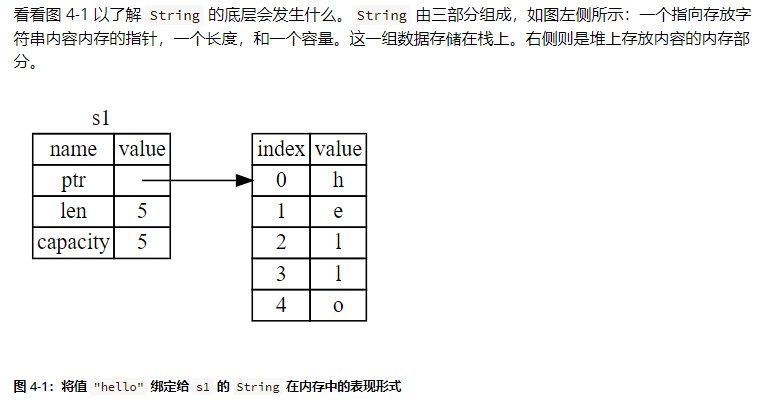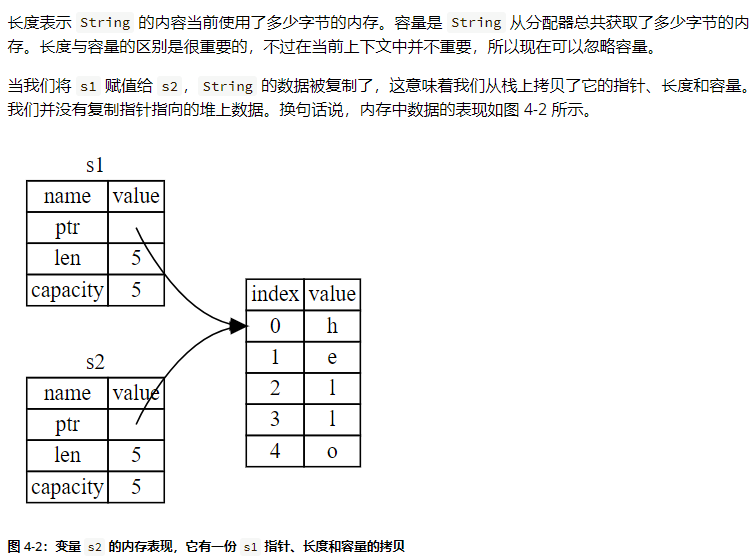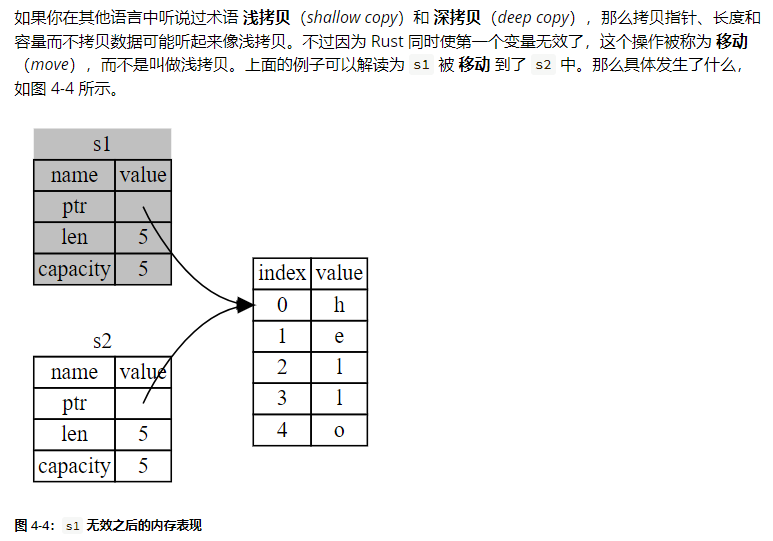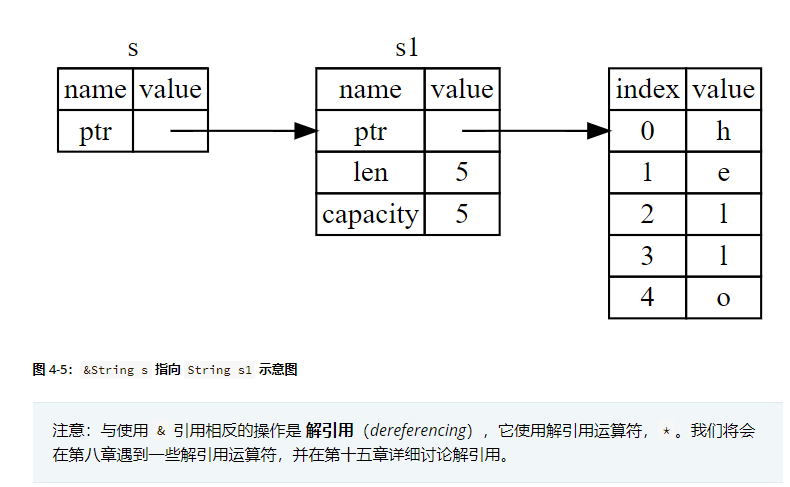rust基础笔记

Rust基础笔记
1 环境搭建
1.1 安装rust软件
1.2 hello world程序
- 创建hello_world程序
$ cargo new hello_world
Created binary (application) `hello_world` package- Cargo.toml: 配置文件
- src文件夹: 存放rust源文件
- 构建
$ cargo build
Compiling hello_world v0.1.0 (D:\learn_rust\hello_world)
Finished dev [unoptimized + debuginfo] target(s) in 1.25s- 运行
$ cargo run
Finished dev [unoptimized + debuginfo] target(s) in 0.01s
Running `target\debug\hello_world.exe`
Hello, world!至此,我们就可以运行进行rust程序的学习了;
2 数据类型
2.1 变量
- 默认let定义的是不可变变量
- 使用
mut创建可变变量
let _a = 12; // 不可变变量
let mut _b = 12; // 可变变量
_a = 13; // 编译报错: cannot assign twice to immutable variable
_b = 13; // 编译成功
那为什么可以称之为不可变变量,为什么不可以称之为常量; 因为,虽然不可以修改,但是可以重新绑定
let _a = 13; // 不可变变量重新绑定13
let _a = 14; // 不可变变量重新绑定14
是否可以这样理解,let翻译为绑定,
- 一般let绑定到常量上
- mut绑定到内存上
那么进行一下测试
let _c = 12; // 1. 首先绑定到12这个常量上
let mut _c = 14; // 2. 绑定到变量上
_c = 15; // 3. 可以修改
在进行分析,但是下面的这种绑定的概念出现了问题
fn main() {
let mut _c = 12;
let _d = _c;
_d = 12; // 编译报错
println!("The value of x is: {_c}");
println!("The value of x is: {_d}");
}$ cargo build
Compiling variables_mutability v0.1.0 (D:\github.io\static\demo\rust\variable
s_mutability)
error[E0384]: cannot assign twice to immutable variable `_d`
--> src\main.rs:4:5
|
3 | let _d = _c;
| --
| |
| first assignment to `_d`
| help: consider making this binding mutable: `mut _d`
4 | _d = 12; // 编译报错
| ^^^^^^^ cannot assign twice to immutable variable
For more information about this error, try `rustc --explain E0384`.
error: could not compile `variables_mutability` due to previous error当然,此时我还不了解什么概念,因此作出猜测 编译期间通过符号表的属性判断变量是否进行修改
但是可以重新绑定
fn main() {
let mut _c = 12;
let _d = _c;
let _d = 12; // 编译报错
println!("The value of x is: {_c}");
println!("The value of x is: {_d}");
}2.2 常量
类似于不可变变量, 常量 (constants) 是绑定到一个名称的不允许改变的值,不过常量与变量还是有一些区别。
const HOURS_IN_SECONDS: u32 = 60 * 60;2.3 标量类型
2.3.1 整数类型
整数没有小数部分
无符号以u开头
有符号以i开头
Length Signed Unsigned 8-Bit i8u816-Bit i16u1632-Bit i32u3264-Bit i64u64128-Bit i128u128arch iszieusize
2.3.2 浮点类型
默认浮点为64
f32–> 32浮点f64–> 64浮点
2.3.3 布尔类型
- 一个字节的大小
- 符号是
bool - 两个值
true/false
2.3.4 字符类型
- rust使用
char描述 - 使用4个字节存储
2.4 复合类型
2.4.1 元组(tuple)
- Tuple可以将多个值放在一个数据类型里
- Tuple长度是固定的
let tup:(i32, i64, i128) = (500, 1000, 1500);
let (x, y, z) = tup;
println!("{} {} {}", x, y, z);2.4.2 数组(array)
- 数组也可以将多个值放在一个类型里
- 数组的元素必须相同
- 数组的长度是固定的
let months = [
"Jan",
"Feb",
"Mar",
"Apr",
"Jun",
"Jly",
"Aug",
"Sep",
"Oct",
"Nov",
"Dec"
];
let mount_1st = months[0];
let mount_2nd = months[2];
println!("mount_1st:{mount_1st} mount_2nd:{mount_2nd}");3 控制流
3.1 条件语句
let number = 3;
if number < 5 {
println!("condition was true");
} else {
println!("condition was false");
}
// condition was true
let number = 5;
if number < 5 {
println!("condition was true");
} else if number > 5 {
println!("condition was false");
} else {
println!("condition was five");
}
// condition was five
fn main() {
// 1. if条件语句
let number = 3;
if number < 5 {
println!("condition was true");
} else {
println!("condition was false");
}
// 2. 使用 else if 处理多重条件
if number % 4 == 0 {
println!("number is divisible by 4");
} else if number % 3 == 0 {
println!("number is divisible by 3");
} else if number % 2 == 0 {
println!("number is divisible by 2");
} else {
println!("number is not divisible by 4, 3, or 2");
}
// 3.在 let 语句中使用 if
let condition = true;
let number = if condition { 5 } else { 6 };
println!("The value of number is: {number}");
// 4. 使用 loop 重复执行代码
let mut x = 0;
loop {
println!("again! {}", x);
x += 1;
if x > 12 {
break;
}
}
// 5. 从循环返回值
let mut counter = 0;
let result = loop {
counter += 1;
if counter == 10 {
break counter * 2;
}
};
println!("The result is {result}");
// 如果存在嵌套循环,break 和 continue 应用于此时最内层的循环。
// 你可以选择在一个循环上指定一个 循环标签(loop label),
// 然后将标签与 break 或 continue 一起使用,
// 使这些关键字应用于已标记的循环而不是最内层的循环
// 6. 循环标签:在多个循环之间消除歧义
let mut count = 0;
'counting_up: loop {
println!("count = {count}");
let mut remaining = 10;
loop {
println!("remaining = {remaining}");
if remaining == 9 {
break;
}
if count == 2 {
break 'counting_up;
}
remaining -= 1;
}
count += 1;
}
println!("End count = {count}");
// 7. while 条件循环
let mut number = 3;
while number != 0 {
println!("{number}!");
number -= 1;
}
println!("LIFTOFF!!!");
// 8. 使用 for 遍历集合
let a = [10, 20, 30, 40, 50];
for element in a {
println!("the value is: {element}");
}
}4 函数
定义普通函数
fn <函数名> (<参数>) {
<函数体>
}fn another_function() {
println!("Another function.");
}定义输入参数
参数必须指定类型
/// rust函数带参数
fn another_function_with_args(x: i32) {
println!("The value of x is: {x}");
}
/// rust函数带两个参数
fn print_labeled_measurement(value: i32, unit_label: char) {
println!("The measurement is: {value}{unit_label}");
}定义返回值
必须指定返回值
函数可以向调用它的代码返回值。我们并不对返回值命名,但要在箭头(->)后声明它的类型。
在Rust中,函数的返回值等同于函数体最后一个表达式的值。
使用return关键字和指定值,可从函数中提前返回;但大部分函数隐式的返回最后的表达式.
/// 带返回值的函数
fn function_with_return_value1() -> i32 {
println!("带返回值的函数");
5
}
/// 带返回值的函数
fn function_with_return_value2() -> i32 {
println!("带返回值的函数在return之前");
return 5;
println!("带返回值的函数在return之后");
}5 所有权
所有程序都必须管理其运行时使用计算机内存的方式。一些语言中具有垃圾回收机制, 在程序运行时有规律地寻找> 不再使用的内存;在另一些语言中,程序员必须亲自分配和释放内存。 Rust 则选择了第三种方式:通过所有权系统管理内存,编译器在编译时会根据一系列的规则进行检查。 如果违反了任何这些规则,程序都不能编译。在运行时,所有权系统的任何功能都不会减慢程序
所有权规则
- Rust 中的每一个值都有一个 所有者(owner)。
- 值在任一时刻有且只有一个所有者。
- 当所有者(变量)离开作用域,这个值将被丢弃。
首先, 我们需要看一个代码,并且执行编译;
fn main() {
let s1 = String::from("hello");
let s2 = s1;
println!("{} {}", s1, s2);
}error[E0382]: borrow of moved value: `s1`
--> src\main.rs:5:23
|
2 | let s1 = String::from("hello");
| -- move occurs because `s1` has type `String`, which does not implement the `Copy` trait
3 | let s2 = s1;
| -- value moved here
4 |
5 | println!("{} {}", s1, s2);
| ^^ value borrowed here after move
|
= note: this error originates in the macro `$crate::format_args_nl` which comes from the expansion of the macro `println` (in Nightly builds, run with -Z macro-backtrace for more info)
help: consider cloning the value if the performance cost is acceptable
|
3 | let s2 = s1.clone();
| ++++++++
For more information about this error, try `rustc --explain E0382`.
error: could not compile `ownship` due to previous error在我们看来, 这个程序为啥编译失败了呢?
不应该s2保留了s1的备份么?


之前我们提到过当变量离开作用域后,Rust 自动调用 drop 函数并清理变量的堆内存。不过图 4-2 展示了两个数据指针指向了同一位置。这就有了一个问题:当 s2 和 s1 离开作用域,他们都会尝试释放相同的内存。这是一个叫做 二次释放(double free)的错误,也是之前提到过的内存安全性 bug 之一。两次释放(相同)内存会导致内存污染,它可能会导致潜在的安全漏洞。
为了确保内存安全,在 let s2 = s1; 之后,Rust 认为 s1 不再有效,因此 Rust 不需要在 s1 离开作用域后清理任何东西。看看在 s2 被创建之后尝试使用 s1 会发生什么;这段代码不能运行:
那么就可以知道,此时s1移动了s2上面,s1不在合法的运行.

但是, 我们确实需要一个保证两个变量都是有效的,那么
fn main() {
let s1 = String::from("hello");
let s2 = s1.clone();
println!("s1 = {}, s2 = {}", s1, s2);
}此时编译的结果就可以通过了.
但是呢?
let x = 5;
let y = x;
println!("x = {}, y = {}", x, y);我们可以知道,上面的确实可以编译通过, 这个又是什么原因呢?
从根本上来说, 我们可以这样理解,rust保护内存,防止泄露
x,y保存在栈上,不会泄露,因此可以直接拷贝
原因是像整型这样的在编译时已知大小的类型被整个存储在栈上,所以拷贝其实际的值是快速的。这意味着没有理由在创建变量 y 后使 x 无效。换句话说,这里没有深浅拷贝的区别,所以这里调用 clone 并不会与通常的浅拷贝有什么不同,我们可以不用管它。
那么哪些类型实现了 Copy trait 呢?你可以查看给定类型的文档来确认,不过作为一个通用的规则,任何一组简单标量值的组合都可以实现 Copy,任何不需要分配内存或某种形式资源的类型都可以实现 Copy 。如下是一些 Copy 的类型:
- 所有整数类型,比如
u32。 - 布尔类型,
bool,它的值是true和false。 - 所有浮点数类型,比如
f64。 - 字符类型,
char。 - 元组,当且仅当其包含的类型也都实现
Copy的时候。比如,(i32, i32)实现了Copy,但(i32, String)就没有。
fn main() {
let s = String::from("Test"); // s 进入作用域
takes_ownership(s);
println!("{}", s); // value borrowed here after move
}
fn takes_ownership(some_string: String) { // some_string 进入作用域
println!("{}", some_string);
} // 这里,some_string 移出作用域并调用 `drop` 方法。
// 占用的内存被释放
$ cargo build
Compiling ownship v0.1.0 (D:\github.io\static\demo\rust\ownship)
error[E0382]: borrow of moved value: `s`
--> src\main.rs:14:20
|
12 | let s = String::from("Test"); // s 进入作用域
| - move occurs because `s` has type `String`, which does not implement the `Copy` trait
13 | takes_ownership(s);
| - value moved here
14 | println!("{}", s);
| ^ value borrowed here after move
|
note: consider changing this parameter type in function `takes_ownership` to borrow instead if owning the value isn't necessary
--> src\main.rs:20:33
|
20 | fn takes_ownership(some_string: String) { // some_string 进入作用域
| --------------- ^^^^^^ this parameter takes ownership of the value
| |
| in this function
= note: this error originates in the macro `$crate::format_args_nl` which comes from the expansion of the macro `println` (in Nightly builds, run with -Z macro-backtrace for more info)
help: consider cloning the value if the performance cost is acceptable
|
13 | takes_ownership(s.clone());
| ++++++++
For more information about this error, try `rustc --explain E0382`.
error: could not compile `ownship` due to previous error但是如果可以使用copy的话会造成大量的拷贝,因此需要使用引用与借用,
fn main() {
let s1 = String::from("hello");
let len = calculate_length(&s1);
println!("The length of '{}' is {}.", s1, len);
}
fn calculate_length(s: &String) -> usize {
s.len()
}首先,注意变量声明和函数返回值中的所有元组代码都消失了。其次,注意我们传递 &s1 给 calculate_length,同时在函数定义中,我们获取 &String 而不是 String。这些 & 符号就是 引用,它们允许你使用值但不获取其所有权。图 4-5 展示了一张示意图。

我们将创建一个引用的行为称为 借用(borrowing)
如果我们尝试修改借用的变量呢?
fn main() {
let s = String::from("hello");
change(&s);
}
fn change(some_string: &String) {
some_string.push_str(", world");
}$ cargo run
Compiling ownership v0.1.0 (file:///projects/ownership)
error[E0596]: cannot borrow `*some_string` as mutable, as it is behind a `&` reference
--> src/main.rs:8:5
|
7 | fn change(some_string: &String) {
| ------- help: consider changing this to be a mutable reference: `&mut String`
8 | some_string.push_str(", world");
| ^^^^^^^^^^^^^^^^^^^^^^^^^^^^^^^ `some_string` is a `&` reference, so the data it refers to cannot be borrowed as mutable
For more information about this error, try `rustc --explain E0596`.
error: could not compile `ownership` due to previous error那么如何变动呢?
fn main() {
let mut s = String::from("hello");
change(&mut s);
}
fn change(some_string: &mut String) {
some_string.push_str(", world");
}数据竞争(data race)类似于竞态条件,它可由这三个行为造成
两个或更多指针同时访问同一数据。
至少有一个指针被用来写入数据。
没有同步数据访问的机制。
数据竞争会导致未定义行为,难以在运行时追踪,并且难以诊断和修复;Rust 避免了这种情况的发生,因为它甚至不会编译存在数据竞争的代码!
let mut s = String::from("hello");
let r1 = &mut s;
let r2 = &mut s;
println!("{}, {}", r1, r2);error[E0499]: cannot borrow `s` as mutable more than once at a time
--> src\main.rs:28:14
|
27 | let r1 = &mut s;
| ------ first mutable borrow occurs here
28 | let r2 = &mut s;
| ^^^^^^ second mutable borrow occurs here
29 |
30 | println!("{}, {}", r1, r2);
| -- first borrow later used here
For more information about this error, try `rustc --explain E0499`.
error: could not compile `ownship` due to previous error悬垂引用(Dangling References)
在具有指针的语言中,很容易通过释放内存时保留指向它的指针而错误地生成一个 悬垂指针(dangling pointer),所谓悬垂指针是其指向的内存可能已经被分配给其它持有者。相比之下,在 Rust 中编译器确保引用永远也不会变成悬垂状态:当你拥有一些数据的引用,编译器确保数据不会在其引用之前离开作用域。
fn main() {
let reference_to_nothing = dangle();
}
fn dangle() -> &String {
let s = String::from("hello");
&s
}$ cargo run
Compiling ownership v0.1.0 (file:///projects/ownership)
error[E0106]: missing lifetime specifier
--> src/main.rs:5:16
|
5 | fn dangle() -> &String {
| ^ expected named lifetime parameter
|
= help: this function's return type contains a borrowed value, but there is no value for it to be borrowed from
help: consider using the `'static` lifetime
|
5 | fn dangle() -> &'static String {
| +++++++
For more information about this error, try `rustc --explain E0106`.
error: could not compile `ownership` due to previous error因为 s 是在 dangle 函数内创建的,当 dangle 的代码执行完毕后,s 将被释放。不过我们尝试返回它的引用。这意味着这个引用会指向一个无效的 String,这可不对!Rust 不会允许我们这么做。
fn no_dangle() -> String {
let s = String::from("hello");
s
}这样就没有任何错误了。所有权被移动出去,所以没有值被释放。
引用的规则
让我们概括一下之前对引用的讨论:
- 在任意给定时间,要么 只能有一个可变引用,要么 只能有多个不可变引用。
- 引用必须总是有效的。
6 枚举
6.1 定义枚举
定义枚举
#[derive(Debug)]
enum IpAddrKind {
V4,
V6,
}
// 实例化枚举
let addr1 = IpAddrKind::V4;
let addr2 = IpAddrKind::V6;
// 打印枚举值
println!("{:#?}", addr1);
println!("{:#?}", addr2);6.2 枚举值作为函数参数
fn route(ip_kind : IpAddrKind) {
println!("{:#?}", ip_kind);
}
route(addr1);
route(addr2);6.3 枚举值作为结构体成员
#[derive(Debug)]
struct IpAddr {
kind : IpAddrKind,
addr : String,
}6.4 match控制流结构
enum Coin {
Penny,
Nickel,
Dime,
Quarter,
}
fn value_in_cents(coin: Coin) -> u8 {
match coin {
Coin::Penny => 1,
Coin::Nickel => 5,
Coin::Dime => 10,
Coin::Quarter => 25,
}
}6.5 option匹配
fn main() {
let x: i32 = 5;
let y: Option<i32> = Some(5);
let _z = x + y;
}但是此时会编译报错
error[E0277]: cannot add `Option<i32>` to `i32`
--> src\main.rs:4:16
|
4 | let _z = x + y;
| ^ no implementation for `i32 + Option<i32>`
|
= help: the trait `Add<Option<i32>>` is not implemented for `i32`
= help: the following other types implement trait `Add<Rhs>`:
<&'a i32 as Add<i32>>
<&i32 as Add<&i32>>
<i32 as Add<&i32>>
<i32 as Add>fn main() {
let x: i32 = 5;
let y: Option<i32> = Some(5);
let _z = x + y.unwrap();
}6.6 if let语法糖
fn main() {
let v = Some(8);
// grammar sugar
if let Some(3) = v {
println!("Succ");
} else {
println!("Fail")
}
}7 工程管理
- Package(包)
- Crate(单元包)
- Moule(模块)
- Path(路径)
7.1 Package&Crate
# 创建package
cargo new package_name8 集合
- vector 允许我们一个挨着一个地储存一系列数量可变的值
- string 是字符的集合。我们之前见过 String 类型,不过在本章我们将深入了解。
- Hashmap 允许我们将值与一个特定的键(key)相关联。这是一个叫做 map 的更通用的数据结构的特定实现。
8.1 Vector
8.1.1 新建 vector
fn main() {
// 1. 新建vector
let _v: Vec<i32> = Vec::new();
// 2. 使用宏来初始化vector
let _v = vec![1, 2, 3];
}8.1.2 更新 vector
对于新建一个 vector 并向其增加元素,可以使用 push 方法,如示例 8-3 所示:
fn main() {
let mut v = Vec::new();
v.push(5);
v.push(6);
v.push(7);
v.push(8);
}8.1.3 读取vector的元素
// 直接读取
println!("v[0] {}", v[0]); // 5
println!("v[1] {}", v[1]); // 5
// 引用数据
println!("v[0] {}", &v[0]); // 5
println!("v[1] {}", &v[1]); // 5
// get方法
println!("v[0] {:?}", v.get(0)); // Some(5)
println!("v[1] {:?}", v.get(1)); // Some(6)
// 遍历方法
for i in &v {
println!("{}", i);
}8.2 String
8.2.1 创建字符串
fn main() {
// 1.创建字符串
let mut _s = String::new();
// 2.创建空字符串
let data = "initial contents";
let _s = data.to_string();
// 该方法也可直接用于字符串字面值:
let _s = "initial contents".to_string();
// 直接对字符串进行转化
let _s = String::from("initial contents");
}8.2.2 更新字符串
// 1. 使用 push_str 和 push 附加字符串
let mut s = String::from("Hello");
s.push_str("World");
println!("{}", s);
s.push('!');
println!("{}", s);8.2.3 索引字符串
编译报错
let _s1 = String::from("hello");
let h = s1[0]; // error[E0277]: the type `String` cannot be indexed by `{integer}
但是可以直接进行遍历
for c in "Зд".chars() {
println!("{c}");
}8.2.4 slice
let hello = "Здравствуйте";
let s = &hello[0..4];
println!("{}", s);8.3 Hashmap
最后介绍的常用集合类型是 哈希 map(hash map)。HashMap<K, V> 类型储存了一个键类型 K 对应一个值类型 V 的映射。它通过一个 哈希函数(hashing function)来实现映射,决定如何将键和值放入内存中
8.3.1 创建hanshmap
Hashmap不是一个preload的包,需要手动导入
use std::collections::HashMap; let mut scores = HashMap::new();8.3.2 访问hashmap的值
let team_name = String::from("Blue");
let score = scores.get(&team_name).copied().unwrap_or(0);
println!("{}", score); for (key, value) in &scores {
println!("{key}: {value}");
}8.3.3 更新hashmap
scores.insert(String::from("Blue"), 10);
scores.insert(String::from("Blue"), 25);
println!("{:?}", scores); scores.entry(String::from("Yellow")).or_insert(50);
scores.entry(String::from("Blue")).or_insert(50);
scores.entry(String::from("Green")).or_insert(30);
println!("{:?}", scores);9 错误处理
9.0.4 panic!
用 panic! 处理不可恢复的错误
fn main() {
panic!("crash and burn");
}执行运行
Compiling error_handle v0.1.0 (D:\github.io\static\demo\rust\error_handle)
Finished dev [unoptimized + debuginfo] target(s) in 0.86s
Running `target\debug\error_handle.exe`
thread 'main' panicked at 'Hello, world!', src\main.rs:2:5
note: run with `RUST_BACKTRACE=1` environment variable to display a backtrace
error: process didn't exit successfully: `target\debug\error_handle.exe` (exit code: 101)9.0.5 Result枚举
用
Result枚举处理可恢复的错误
enum Result<T, E> {
OK(T),
Err(E),
}T和E是泛型类型参数:
T代表成功时返回的Ok成员中的数据的类型,E代表失败时返回的Err成员中的错误的类型
9.0.6 match处理
use std::fs::File;
fn main() {
// 1. panic! 处理不可以恢复的错误
// 比较类似C/C++的assert语法
// panic!("Hello, world!");
// 2. Result!可以恢复的错误
let f = File::open("Heelo.txt");
match f {
Ok(file) => file,
Err(error) => {
panic!("Error opening file {:?}", error);
}
};
}尝试恢复某一错误
use std::fs::File;
fn main() {
let f = File::open("Hello.txt");
match f {
Ok(file) => file,
Err(error) => match error.kind() {
ErrorKind::NotFound => match File::create("Hello.txt") {
Ok(fc) => fc,
Err(e) => panic!("Error creating file {:?}", e),
},
oe => panic!("Error opening file {:?}", oe),
},
};
}此时如果运行此程序就不会显示报错了,并且会创建一个新的文件
使用unwarp执行快捷操作
use std::fs::File;
fn main() {
let f = File::open("Hello.txt").unwrap();
}- Result 值是成员 Ok,unwrap 会返回 Ok 中的值。
- Result 是成员 Err,unwrap 会为我们调用 panic!
使用expect执行快捷操作
use std::fs::File;
fn main() {
let f = File::open("Hello.txt").expect("无法打开文件");
}